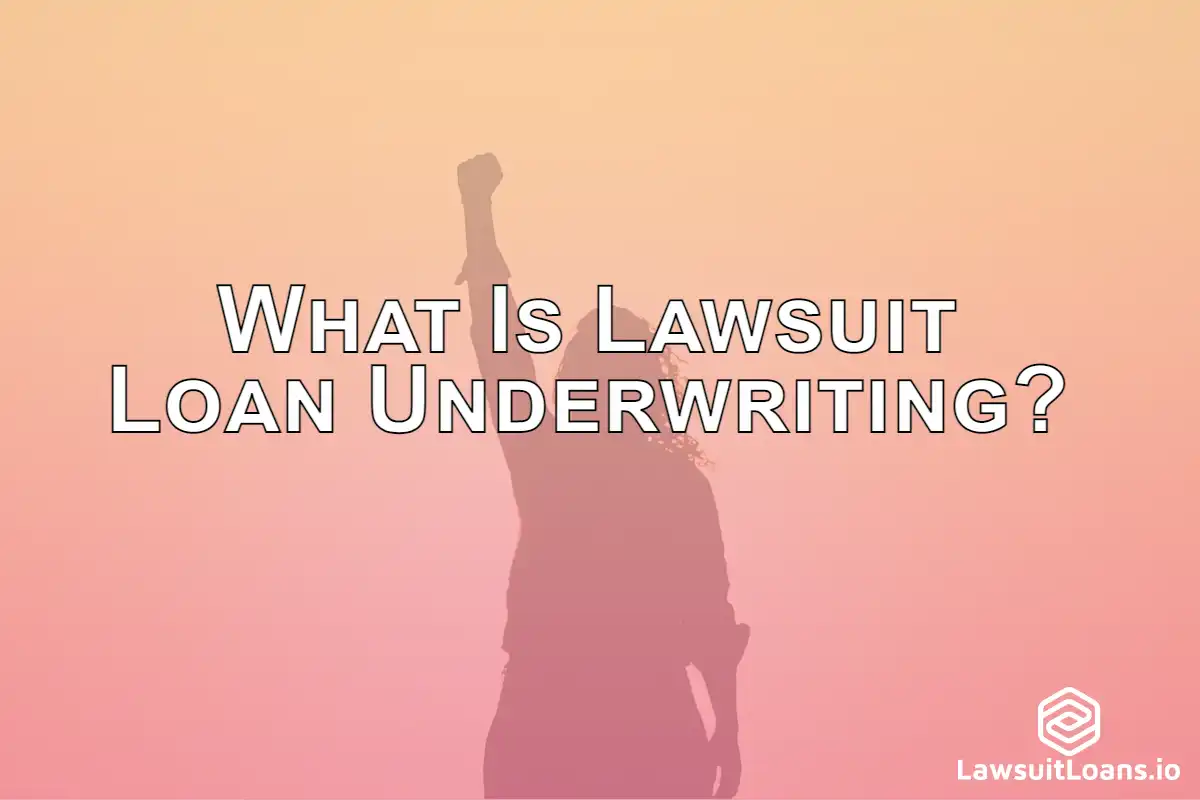What is Lawsuit Loan Underwriting?
Lawsuit loan companies review legal cases by collecting information about a case and submitting it to their internal attorneys (or underwriters). Learn more about the underwriting process by reading below.




What Is Lawsuit Loan Underwriting?
When you are waiting for settlement of a personal injury lawsuit, you may need money for medical bills or to cover household expenses. Lawsuit loans give you the cash needed to avoid financial hardship and give the law firm handling your case the time to get you the settlement or verdict that you deserve.
An essential step in determining whether a legal funding company approves your case for a cash advance is the underwriting process. The best way to improve the chance of your lawsuit being approved for funding is to know what funding company underwritings look for when evaluating a case and the things that you can do to accelerate the process.
As you continue reading, you’ll learn the following key points:
- What lawsuit loans are.
- Factors underwriters look at to evaluate a lawsuit for funding.
- The reason why your credit scores, income, and assets do not play a significant role in the funding process.
- What to look out for when looking for a lender.
It may seem like a lot to learn, but it will put you in position to make an informed choice as a borrower that could save you money and headaches. Here to start you out are the basics of lawsuit loans and pre-settlement funding underwriting.
Apply NowWhat Is Lawsuit Funding?
It was not that long ago that unless you had a friend or relative willing to help you out, the only way to obtain money to pay bills and other expenses while waiting to receive money from a pending lawsuit was to borrow it from a bank or as a cash advance on your credit card. A relatively new option for plaintiffs with pending lawsuits who need financial assistance is the litigation funding industry.
Lawsuit funding has existed in other parts of the world for decades and in the United States since around 2010. It typically involves a financial arrangement where a lender or funding company agrees to provide a cash advance in exchange for its repayment with interest from the proceeds of a settlement or verdict in a pending lawsuit.
The cash advance that you receive from a funder is not a loan in the traditional sense, which is what sets lawsuit loans apart. When you apply for a personal loan at your bank, the loan officer will need information about your employment, income, and assets you own in order to establish that you have the ability to repay the loan. The bank will do a credit check and look at your credit scores to determine whether you are a good credit risk before it agrees to lend you the money.
It’s a different process with litigation funding. A funder does not do a credit check, review your credit scores, or ask you about your ability to repay the lawsuit cash advance. Lawsuit loans are non-recourse loans, which means the funder cannot look to you, the borrower, for repayment. It can only look to the lawsuit settlement for repayment and cannot go after your income or assets for repayment.
The lawsuit funding company assumes the risk of loss in the event your lawsuit does not result in an outcome in your favor. This is the reason that litigation finance companies rely on the underwriting process to evaluate the strength of the pending lawsuit and the likelihood of a settlement or judgment in your favor as well as the anticipated value of the claim.
Get up to $500,000 With Rates as Low as 2.5% Simple, Monthly
The Basics of Lawsuit Loan Underwriting
A lawsuit loan company is in business to make money by charging interest on the cash advance it makes to a borrower. Banks when they make loans and insurance companies before they issue insurance policies use an underwriting process to evaluate the risk they are taking. Banks want to know whether borrowers can repay a loan, and insurance companies want to limit their risk of loss by determining the likelihood of a claim and setting premium rates high enough to offset the risk.
When you apply to a legal funding company for a lawsuit loan, the underwriting process focuses on your lawsuit, and more specifically, its strength in terms of likelihood of it resulting in a settlement or verdict in your favor and its anticipated value.
The importance of claim strength and value go back to the non-recourse nature of lawsuit funding: A funding company does not recover the cash advance and interest earned on it unless you win and your settlement or verdict amount is enough to cover your legal fees and litigation expenses while leaving enough left over to pay the lawsuit loan.
The Underwriting Process
The underwriting process begins when you submit a lawsuit loan application to a legal funding company. An underwriter working for the funding company contacts the attorney representing you in the lawsuit to obtain information about it. Some of the information an underwriter may want includes:
- The type of claim, such as personal injury, breach of contract, commercial litigation, employment law, or mass tort.
- Court where lawsuit was filed and information about it, including index number and date filed.
- Whether the defendants have insurance coverage for the claim.
- Evidence your attorney has that proves the defendants were liable or at fault in causing you to suffer harm, including police reports and witness statements.
- Evidence, including medical records, supporting your claim for damages.
An underwriter reviews all of the documents and information about the case to determine how likely it is that an insurance company representing one or more of the defendants in the case would be willing to settle the claim or that a judge or jury would award you a judgment if the case went to trial.
The underwriter will also evaluate the potential value of the lawsuit based on the damages or harm that you sustained and how long it could take before there is a settlement or judgment. The projected settlement value must be enough to pay the legal fees and litigation expenses of your attorney and leave enough available to repay the lawsuit loan, including the interest that accrues from the date of the cash advance until it is repaid.
Notice that the lawsuit loan underwriting process does not focus attention on you, the borrower. This is quite different from the loan approval process that takes place when you apply for a traditional loan from a bank or other financial institution where your ability to repay the debt makes your income, employment status and asset ownership important factors. The only source for repayment of a lawsuit loan is the settlement of your claim, so the approval process focuses on the claim instead of on you.
Get Started
Apply today and get funds in as little as 24 hours!
What to look for when finding a lawsuit funding underwriter?
When shopping for lawsuit funding, all companies may look alike because they all promise a settlement cash advance, but there are differences to look for in order to find the best underwriter with the best pricing. A few of the things to look for when comparing pre-settlement loan companies include:
- Reputation: Look at online reviews to learn what people have to say about their experience with a funding company. The lawyer representing you in your lawsuit may be an excellent source for information about a particular company and its underwriting requirements.
- Experience: Companies that have been in the lawsuit funding business for a number of years generally have experienced underwriters working for them, which can expedite the underwriting process.
- Transparency: You want to work with a company that fails to openly and honestly respond to questions about interest rates, repayment terms, and other aspects of the application, underwriting and funding processes they use.
- Interest Rates and Fees: Steer clear of companies that refuse to discuss pricing with you or respond by asking you to wait until after you are approved for a loan. Reputable companies will openly and freely discuss their interest rates, including whether they use simple or compound interest, and disclose other fees or charges during your initial contact with them.
- Licensing and Regulation: The federal government does not currently regulate the lawsuit funding industry, but some states have passed laws limiting interest rates and setting other guidelines for litigation funding. Ask your attorney to check the laws in your state and choose a funding company that complies with them.
Shop around and get quotes from a few companies that do business in your state, and talk to your attorney about what each one has to offer before choosing one.